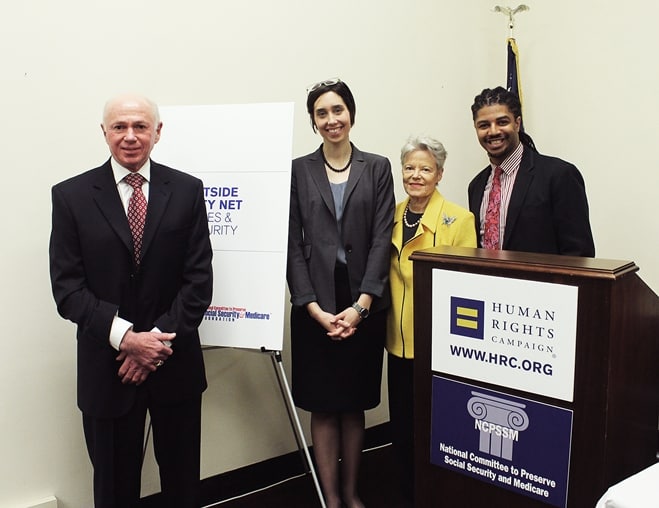
We were proud today to release a new report, co-authored with the Human Rights Campaign detailing how current law leaves America’s same sex couples and their families living outside the safety net.
Social Security is the keystone of most Americans’ retirement planning and provides valuable income protection to families in case of a worker’s disability or death. Yet, same-sex couples and many of their children are denied access to Social Security benefits, even though they have contributed to the program throughout their working lives. The National Committee to Preserve Social Security and Medicare Foundation and the Human Rights Campaign Foundation have issued a new report “Living Outside the Safety Net.” This report examines the impact this inequality has on millions of lesbian and gay families and offers legislative solutions.
“Social Security has a long tradition of evolving to more effectively protect America’s workers and their families as our nation changes. In fact, that is key to the program’s unparalleled success across generations. America’s same-sex couples and their families have earned Social Security’s protections the same as any other working American and they deserve the same retirement and economic security the program provides.” … Carroll Estes, NCPSSM Foundation Chair
“Social Security is a safety net for many, and the sole source of income for some. However, same-sex couples go completely unrecognized by Social Security and are routinely denied this benefit. As a result, many surviving same-sex spouses find themselves in a financial free-fall following the death or disability of a spouse.” said HRC Legislative Counsel for Administrative Advocacy Robin Maril. “This report provides an overview of the extent of the economic loss many families are experiencing today because the Social Security system fails to recognize them as a family. Congress must right this wrong by passing legislation that makes these vital benefits available to all Americans.”
The National Committee and HRC support legislation introduced by Congresswoman Linda Sanchez (D-CA) to expand Social Security spousal benefits to same-sex couples. The Social Security Equality Act of 2012 (H.R. 4609) would require the Social Security Administration to provide same-sex couples with the same spousal, survivor and death benefits their heterosexual counterparts receive.
“Same-sex couples pay into Social Security, and they should receive the full benefits they have earned. It is time for us to end discrimination in Social Security so that same-sex couples are not treated as second class citizens. I’m proud to say that I will be re-introducing the ‘Social Security Equality Act’ this Congress to make sure every American receives a benefit based upon their contribution to the program, not their sexual orientation.” Rep. Linda Sanchez (D-CA)
On average, a full retirement age same-sex household with one wage-earner forfeits $675 monthly or $8,100 annually in lost spousal retirement benefits. Blair Dottin-Haley, from Alexandria, Virginia, works for a local non-profit and has been married for nearly two years. His husband is HIV positive; however, even though they both have contributed to Social Security throughout their working lives they are not eligible for spousal benefits.
Blair Dottin-Haley who married his husband two years ago in DC also be joined the panel. “As a married man, it’s important that I protect my family and work to secure the rights and benefits that we’ve earned by joining our lives together.”
This report recommends that Congress:
- Amend the Social Security Act to include same-sex domestic partners as eligible to receive equal benefits following the death, retirement, or disability of their loved one.
- Include language within the Social Security Act’s definition of “child” to reflect the permanent relationship between a legally-unrecognized same-sex parent and his or her child to end the exclusion of many children under current law.
- Repeal the Defense of Marriage Act (DOMA) which currently prevents surviving same-sex spouses from receiving Social Security benefits they are otherwise entitled to.
You can read the full report on the NCPSSM Foundation website here.



